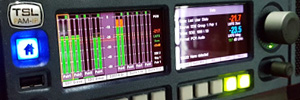Appear X Platform now supports ultra-low latency HEVC encoding
Ultra-low latency HEVC encoding is now supported in workflows managed through the Appear X Platform encoder module.
Appear’s X Platform, used by broadcasters, telcos and production companies for live contribution et remote production, offers the ability to combine encapsulation formats such as MPEG TS, ST2022-6, ST2110, Zixi and SRT with a wide range of codecs and video processing capabilities.
Appear has updated its software for the ECx110 et ECx210 encoder modules to significantly increase the service density when encoding in ultra-low HEVC delay mode. The density per module has been increased to support 4 SD/HD services, or 2 UHD services, while maintaining encoding/decoding latency performance of less than 200 ms.
In addition to the new HEVC encoding, X Platform supports up to 2 Ultra High Definition (UHD) or 8 High Definition (HD) channels in standard and low delay modes.
Hybrid UHD mode
The X Platform also allows its customers to operate in hybrid UHD mode with 1 x UHD and 2 more channels broadcasting in any quality “up to Full HD” simultaneously on the same module. The X Platform’s HDR-capable encoding architecture also offers other interesting advantages, such as the ability to deliver high quality live video with low power consumption, below 85 watts per module.
Thomas Lind, product manager at Appear, remarks the importance of this upgrade, as “the capacity and functionality offered matches the growing trend to encode multiple services at the lowest delay point for VAR and remote production, whilst dramatically reducing the cost per channel prices.” “If required, the same module can quickly switch to other encoding modes, such as OTT encoding, or become a decoder or transcoder,” he adds, extending on the versatility of X Platform.
Cet article vous a plu ?
Abonnez-vous à notre Nourrir Et vous ne manquerez rien.
















